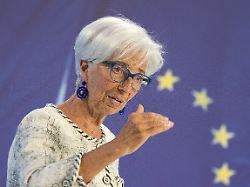“Don’t think about a break”
Lagarde announces further rate hike for July
06/15/2023 4:26 p.m
While the US Federal Reserve has taken an interest rate pause, the head of the ECB does not want to step on the brakes in the euro area. Immediately after the latest interest rate decision, Lagarde considers a further hike in July to be very likely. The economic prospects remained gloomy for the time being.
After the eighth interest rate hike in a row, ECB President Christine Lagarde announced a further hike for the next meeting in July. “It is very likely that we will raise rates further in July,” Lagarde said after the European Central Bank Governing Council’s interest rate decision. “We’re not there yet,” Lagarde said. “We’re not thinking about a break.” The next ECB interest rate meeting is scheduled for July 27th.
Before that, the monetary watchdogs raised the key interest rate by a further 0.25 points. The key interest rate, at which commercial banks can get fresh money from the ECB, has risen to 4.0 percent. The last time the global financial crisis began in early October 2008 was that it was higher, at 4.25 percent. Rising interest rates should push inflation in the euro area back towards the medium-term ECB target of two percent. In contrast to the ECB, the US Federal Reserve had taken a break after ten interest rate hikes in a row: it left its key interest rate in the range of 5.0 to 5.25 percent on Wednesday.
Economy on course for recession
From the ECB President’s point of view, the economic prospects in the euro area remain gloomy for the time being. “Economic growth is likely to remain weak in the short term,” said the Frenchwoman after the interest rate decision. However, the picture will brighten over the course of the year. Reasons are the expected declining inflation and further decreasing delivery bottlenecks. The economic situation in the individual sectors of the economy is still different. The industry continues to weaken – among other things because of the meager global demand and the tightened financial conditions. The service sector, on the other hand, is proving to be resilient.
In the eurozone, the economy was recently on a recessionary course. Gross domestic product (GDP) fell by 0.1 percent from January to March. By the end of 2022, GDP had already shrunk by 0.1 percent. Economists speak of a technical recession if there are two quarters in a row with an economic downturn. The ECB has slightly lowered its growth forecasts for the monetary union. Their economists now only expect growth of 0.9 percent for this year. In March they had still estimated 1.0 percent.
